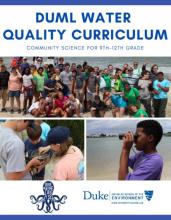
Our oceans, beaches and coastal waterways are full of many land-based items that do not naturally belong there. Plastics, metals, rubber, fabrics, abandoned boats, derelict fishing gear, pesticides, fertilizer and more make their way into our waterways and have created an enormous water quality problem. The issue of water quality is especially poignant because pollution and marine debris negatively affect the health of our marine environment and our economy.
About this resource
This Water Quality Curriculum was developed by Duke University Marine Lab (DUML) scientists working closely with a Science Collaborative project team, and builds on the water resource research DUML is conducting with the University of North Carolina Institute of Marine Sciences. The class activities encourage high school students to explore stormwater and other water quality issues. Students have the opportunity to participate in community science research and showcase their results with their local community to promote coastal stewardship. The learn more, visit the Community Science Initiative Water Quality Program and this complementary Online Classroom Kit.
Curriculum contents and additional resources
1) Classroom Preparations - Background activities are used to introduce the topics of: how to ask questions in science, water quality, and stormwater. Additional resources: Storm Water 101 Slides and Making Science Simple Presentation.
2) Community Science Field Research - Community science field research uses the app - Adopt-A-Drain - to highlight how storm water can affect local water quality. Students collect data, analyze their results and then create ways to share their findings. Additional resources: Adopt-A-Drain App and Slides Introducing the App.
3) Creative Engagement - These community engagement activities encourage students to share their products (i.e., videos, powerpoints, posters, lesson plans) with their community to promote stewardship and civic engagement.
4) Independent Research Options - These optional independent research extensions build on the Adopt-A-Drain research and let students create hypotheses and test for the presence/absence of pesticides/nutrients in local storm water. Additional resources: Video on Sampling Protocols.
Contact
Liz DeMattia, Duke University, Email: liz.demattia@duke.edu